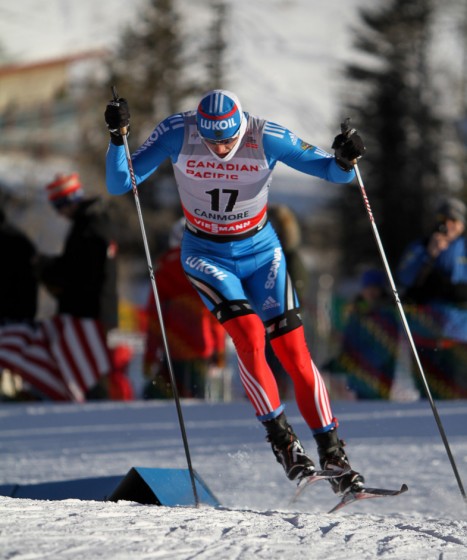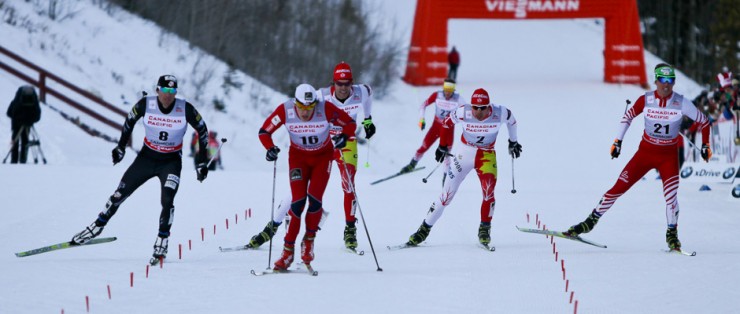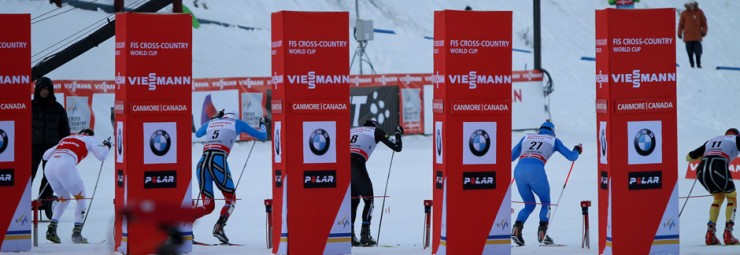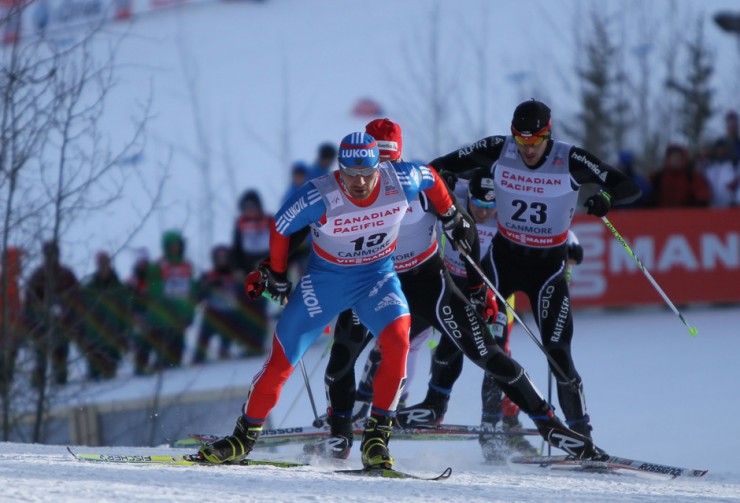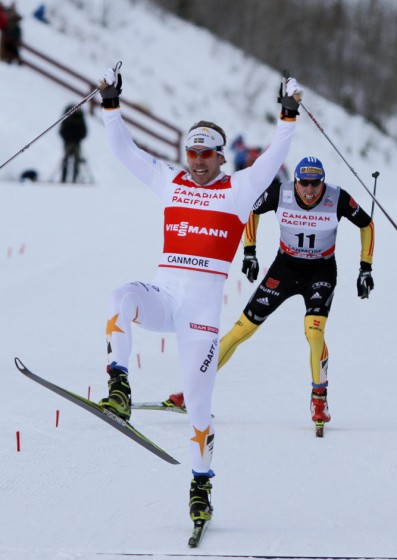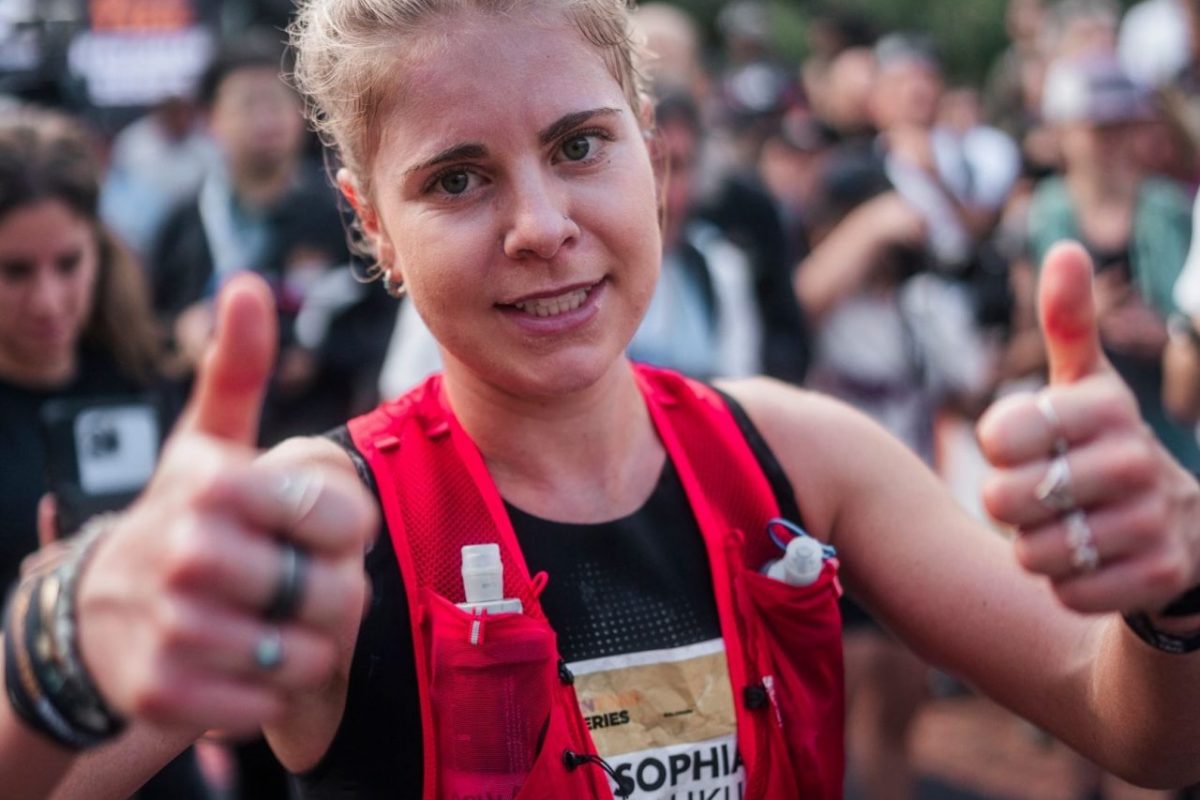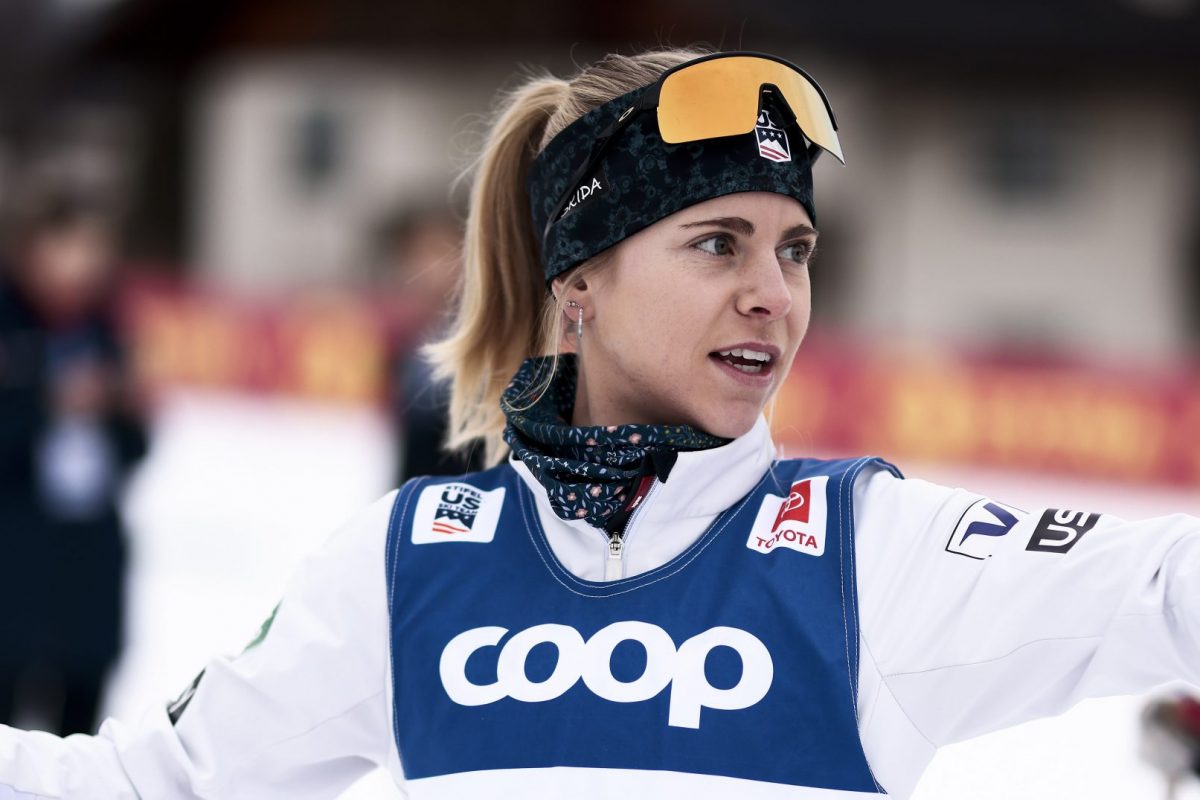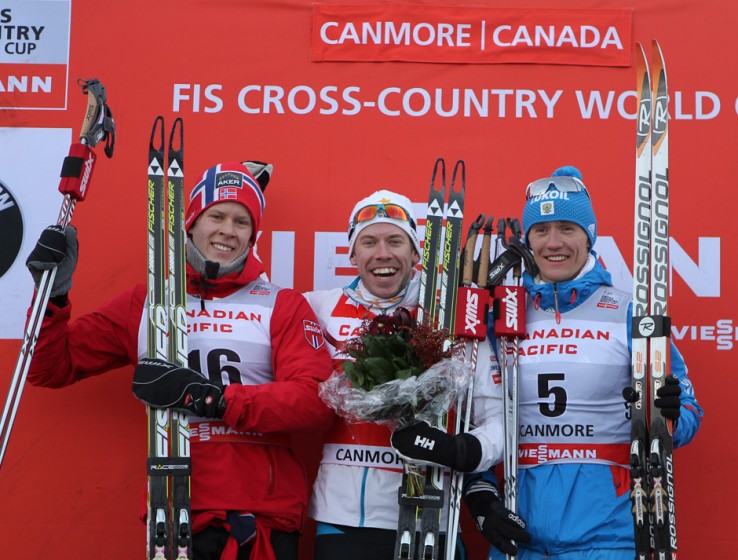
Coverage of the Alberta World Cup made possible through the generous support of Travel Alberta and Tourism Canmore.
CANMORE, Alberta — Domination is a strong word, and one that is often overused when describing athletic performances, there is no better choice when Emil Jönsson (SWE) and Canmore, Alberta are concerned.
With his victory today in the World Cup freestyle sprint, Jönsson has now won three of four sprint starts at the Canmore Nordic Center. Add the fact that he also posted the fastest qualification time in each of those races and it is an understatement when he says, “I really like this place.”
On a new Canmore sprint course that featured a series of tough climbs, followed by a long descent to the finish, Jönsson used patience and a devastating kick to ski clear in each of his heats.
All World Cup races end the same way in Canmore — down a long, fast descent into a slight grade up to the finish. Generally head-to-head competitions will be settled here, and in the men’s sprint race, the first two-thirds of the race was virtually irrelevant.
“In this course, it is definitely not over until the finish line,” said Anders Glöersen (NOR), who finished second to Jönsson. “If you are ten meters behind on the top, you can still be first in the finish.”
Both men employed a similar strategy of hanging back up the hills, working to slot into a favorable drafting position before hammering the homestretch — though they came by it for different reasons.
Jönsson told FasterSkier that he initially planned on attacking over the top of the final steep hill. The course then flattens for 100 meters before the descent, making it the perfect spot for a get-away.
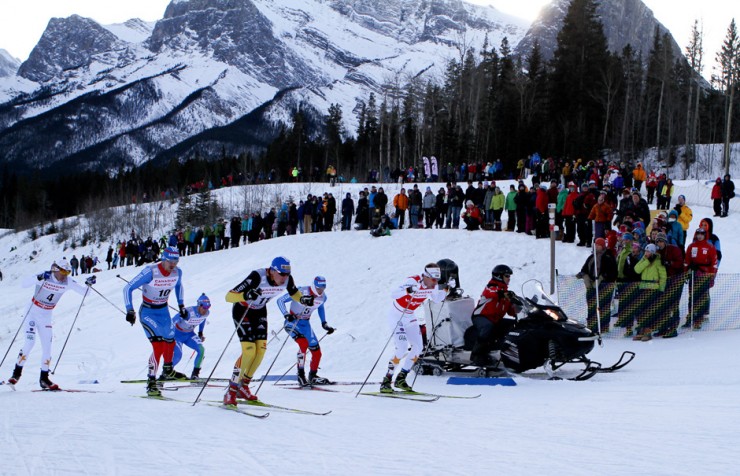
But after watching the women’s quarterfinals he realized that being behind on the downhill was key.
He aimed to be in second or third on the descent, and succeeded each time. As the grade flattened, he would step out and engage the afterburners, moving without apparent effort into the lead.
The Swede had no more information than anyone else, yet others tried to ski from the front, with generally poor results. There were certainly exceptions, including Jesse Cockney (CAN), who led his quarterfinal wire to wire, but in a Groundhog Day moment, the same scene replayed over and over throughout the day — early leaders swallowed up in the homestretch, left to straggle across the line, perhaps ashamed at their audacity to think they could somehow be different.
Glöersen said that over the past several years he has pushed the pace in sprint races, trying to tire out the opposition. This strategy has yielded him seven World Cup podium appearances entering today’s race, but when he felt poorly early in the day, he made an adjustment.
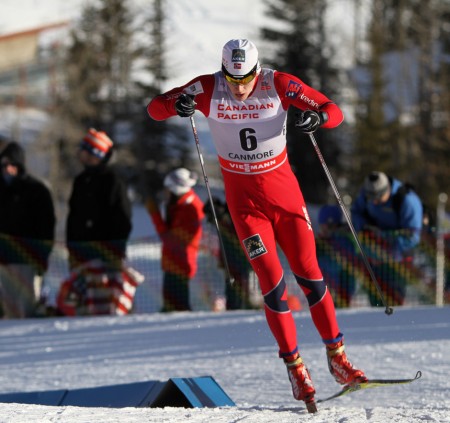
Like Jönsson he remained content to sit in the pack., conserving energy for the sprint to the line.
The plan worked to perfection. He also won each of his first two heats, before running into Jönsson’s closing speed.
“I never sprinted as good in the last 100 meters as I did today,” Glöersen said. “I am very satisfied with that.”
Tim Tscharnke (GER) led out of the start in the final, pushing the pace, but it was the Water Boy, Federico Pellegrino (ITA), who poured it on over the top. Like those who came before him, however, he was doomed at the front.
The entire heat came by, led by Jönsson, leaving the Italian in 6th. Nikita Kriukov (RUS) followed Glöersen to the line, edging Tscharnke for third.
“No one,” Kriukov said in broken English, “have a chance to win before the last downhill.”
While the likes of Pellegrino made the heroic, if foolish, attempt to break away, there was constant competition for the prime spots back in the pack.
“It is pretty tough to get that spot,” Jönsson said. “It is a little different from what we are used to. Then everyone wants to be in first. Now everyone wants to be second or third.”
Proper positioning entering the descent did not ensure success. With as many as six skiers heading down the finish straight together, and just four lanes, real estate was scarce.
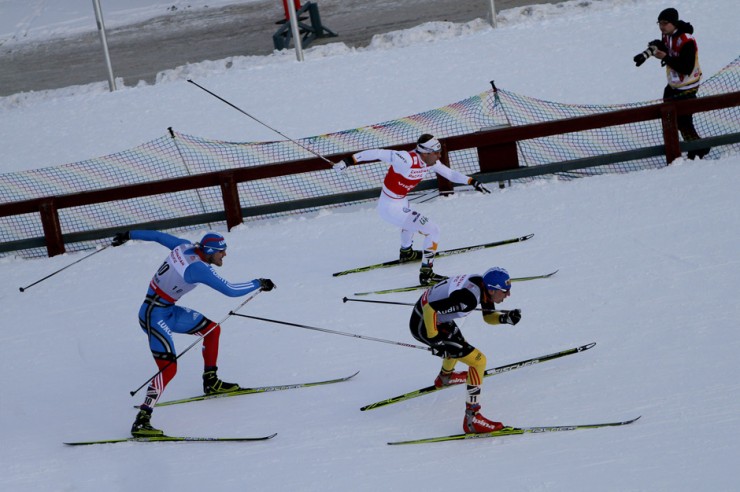
Jönsson used his superior speed to find open space while Glöersen seemed to find a hole each time.
He attributed this success to luck, and maybe some skill. Either way, when he got some space, he “went flat out,” and with power to burn from his conservative approach early on, none other than Jönsson could best him.
Times clocked in at just over two-and-a-half minutes, short for a men’s sprint race, but both Jönsson and Glöersen were clear that this did not make for an easy race.
The Norwegian commented that the snow, especially on the climbs, was not fast and Jönsson pointed to the altitude as another complicating factor.
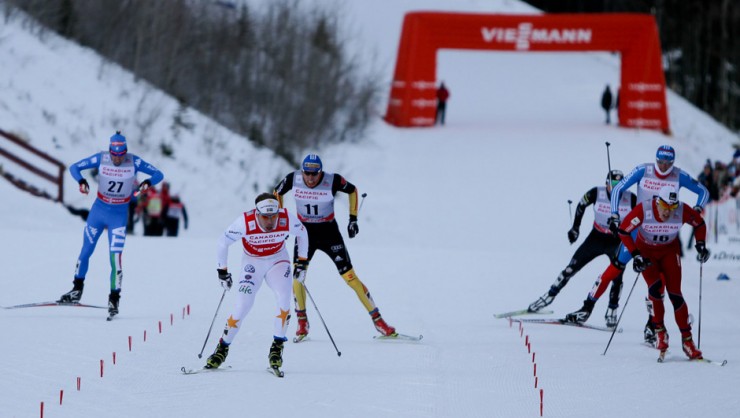
“You can feel it in the legs that you are not used to this,” Jönsson said. “If you go a little bit too hard up, then you are smoked. You have to listen to your body all the time and listen to your legs…to have some power left.”
When asked if he if he likes the fast Canmore finish, Jönsson hesitated before laughing and saying “I must say yes…today I can’t complain.”
He elaborated, adding that in the past he prefers a homestretch that is “a little tougher.” He pointed to Quebec and the steeper run to the line without a descent as an aid, a finish where “you need to struggle a little bit more.”
Of Note:
– The Swiss, who raced a NorAm sprint on this course two weeks ago, qualified five men, but none advanced out of the quarterfinals. They were generally agressive on the climbs, with little success.
– Harald Wurm (AUT) placed 8th after crashing in Quebec and finishing the race on one ski. Wurm was joined in the semis by teammate Bernhard Tritscher, who placed 12th.
– Russian Alexey Petukhov failed to advance out of the quarterfinals and placed 22nd.
– 2012 Sprint Cup Champion Teodor Peterson (SWE) was 48th.
– Six different nations were represented in the final.
